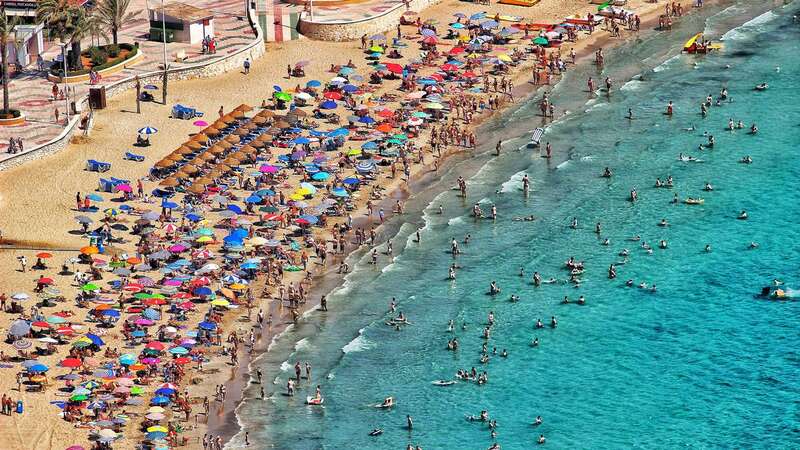
An invasive mosquito species has been found in 13 EU countries, including France, Spain and Greece, with experts linking the rise in dengue fever in Europe to their presence. The European Centre for Disease Prevention and Control (ECDC) has said that climate change is creating favourable conditions for the spread of the tiger mosquito.
Even in Paris, where the Olympic Games are due to take place at the end of July, authorities have been actively monitoring and trapping these insects. The ECDC has warned that international travel could further increase the risk of more outbreaks across Europe, according to the BBC.
They have advised people to remove stagnant water from gardens or balconies, which serve as breeding grounds for mosquitoes, and to use repellents and mosquito nets during the night. A man was seen hunting for these invasive mosquitoes in Paris near the Stade de France on 28 May.
If you can't see the poll, click here
Over the past two decades, mosquitoes have become an increasing threat in Europe. The Asian tiger mosquito, aedes albopictus, considered the most invasive mosquito species globally, is now spreading across Europe from its southern European 'base camp'.
 Queen honoured in London New Year's fireworks before turning into King Charles
Queen honoured in London New Year's fireworks before turning into King Charles
It has established itself in Austria, Bulgaria, Croatia, France, Germany, Greece, Hungary, Italy, Malta, Portugal, Romania, Slovenia and Spain, according to the ECDC, reports Bristol Live.
The tiger mosquito, known for spreading diseases such as dengue fever, chikungunya, and Zika virus, has been spotted in Belgium, Cyprus, Czechia, the Netherlands and Slovakia. Traditionally, these disease-spreading insects are found in parts of Africa, Asia and the Americas.
Another mosquito species, aedes aegypti, which is responsible for transmitting yellow fever among other diseases, has established itself in Cyprus. Experts are expressing concern over its potential spread to other parts of Europe due to its preference for biting humans and its disease transmission capabilities.
Dengue fever is a viral disease transmitted by certain types of mosquitoes. It usually starts with flu-like symptoms such as:
- fever
- headache
- muscle and joint pain
- rash
Symptoms appear in humans 3-14 days after infection.
In some cases, the disease can become severe, leading to conditions like dengue hemorrhagic fever and dengue shock syndrome. When the disease is severe, the risk of mortality is higher. There are four types of viruses that cause dengue, and being immune to one type does not protect against the others. Last year, France recorded eight incidents of multiple infections, Italy had four, and Spain reported two.
Most cases in Europe are imported, reflecting the global movement of people and trade. Imported cases surged to nearly 5,000 last year. However, locally-acquired infections are also on the rise: 130 people were affected in 2023, up from 71 the previous year.
The West Nile virus, another mosquito-borne illness, is now more widespread in Europe than ever, with a case reported in southern Spain as early as March. The European Centre for Disease Prevention and Control (ECDC) warns that climate change is enabling mosquitoes to thrive "very early in the year".
For personal safety, there are several recommended protective actions:
"Europe is already seeing how climate change is creating more favourable conditions for invasive mosquitos to spread into previously unaffected areas and infect more people with diseases such as dengue," stated Andrea Ammon, ECDC's director.
 Celebrity walrus Thor swims off to Arctic after enjoying New Year break in UK
Celebrity walrus Thor swims off to Arctic after enjoying New Year break in UK
She continued: "Increased international travel from dengue-endemic countries will also increase the risk of imported cases, and inevitably also the risk of local outbreaks."
Ammon urges UK residents to adopt "personal protective measures" and emphasises the importance of "early detection of cases, timely surveillance, further research and awareness-raising activities are paramount in those areas in Europe most at risk" in vulnerable European regions.
The World Health Organization (WHO) has revealed that Dengue fever is rife in over 100 countries worldwide, with a staggering six million cases and 7,000 fatalities reported last year. Countries such as Bangladesh, Malaysia, Thailand and Vietnam are the hardest hit.
Malaria, known as the world's deadliest mosquito-borne disease, is transmitted through the bites of infected female anopheles mosquitoes, which have been spotted in Europe. There are mounting fears that Europe could see a surge in malaria cases in the future, if conditions become favourable.
Read more similar news:
Comments:
comments powered by Disqus
































